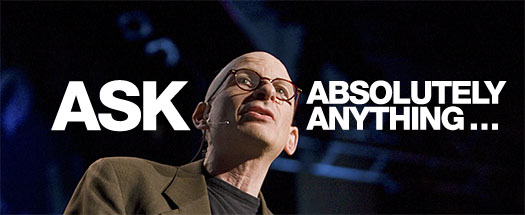
If you were a James Bond villain, how would you take over the world? — Andrew Noseworthy
I’d release a pheremone that increases the fear that people have about doing great things. It would only increase it by 3%, but that would be enough to wipe out most competition. I’m convinced someone is already doing this, by the way.
In the age of tribes, will the benefits outweigh the problems? Specifically, if society fractions into increasingly small groups, won’t we wind up with more rules, more conflict, and more difficulty in communicating, as each develops its own norms and goals? Does this internet-enabled tribal age have implications for how we are going to coexist in society as the “other” becomes an increasingly large part of the population? — David Stewart
I think the idea of negative tribal behavior is older than the Cro Magnon man. Tribes online, in work and in communities aren’t going to make us more violent. We don’t run the risk of more us/them conflicts. I think, instead, we’re going to see more movements that benefit all of us. When enough people care about autism or diabetes or global warming, it helps everyone, even if only a tiny fraction actively participate. Remember, it’s the doing, more than what gets done, that defines tribe.
How do you make “limited edition” physical products feel limited? Especially when they’re limited because you don’t have the capability to produce too many — like hand-made clothes. Should you even try? — John-Phillip Johansson
Of course. There’s a real need for scarcity. The question is how you demonstrate it. Berkin bags? Signed prints? TED invites? By exposing the insiders, you create demand among the outsiders.
What have you learned today? — Antonio Ortiz
I learned that a long walk and calm conversation are an incredible combination if you want to build a bridge.
While getting people to support causes (sign petitions, join a group, etc.) on social networking sites like Facebook has been done very successfully, getting them to donate time and money to the same causes has not. Why do you think this is so? — Pavithra Sankaran
I’m not sure that signing petitions does a thing. I think that easy in/easy out is an axiom, and if you want to make change you need to ask people to do more than just nod at you.
How can small business coffee shops survive a Starbucks next door? — Pascal Lacroix
By being not only different, but better in ways Starbucks cannot. You can’t win by imitating them. Consider having a membership fee, or a different social group. Serve a different item, in a different way, at a different price. Emphasize the ‘Cheers’ friendly element over the ‘get in and get out’ mindset. Exclude certain people or practices. Offer clothes or community performances … stuff they can’t do!
Can you offer any dating pointers? — Mark Smith
I’ve tried the Gregorian, but I find the Julian calendar is a lot more useful.
Among my blogging peers in the marketing/PR/social media niche, I often hear people toss around comments like “he’s the next Seth Godin,” or, “My goal is to be the next Seth Godin.” I’m curious what your advice would be to the next generation of emerging thought leaders — especially the ones eyeing your particular seat. — Tiffany Monhollon
I’m still trying to be pretty good at being ‘this’ Seth Godin, so I wish people who want to be the next one a lot of luck. There’s never been a next Elvis Costello or a next Jill Sobule. There wasn’t even a next Chuck Berry or a next Charlie Chaplin … I think the most productive thing to do during times of change is to be your best self, not the best version of someone else.
Comments (16)
Pingback: 9 Things Great Communicators Do Differently | Freed2Lead
Pingback: What are you afraid of? | Matt Gallagher
Pingback: Seth Godin is an Author Speaker Coach and Seminar Leader | Authors, Speakers, Coaches, Seminar Leaders +